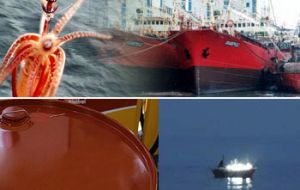MercoPress. South Atlantic News Agency
Argentine jigger fleet complains about soaring costs
 The abundance of squid and falling prices threaten the Argentine industry
The abundance of squid and falling prices threaten the Argentine industry The decline in squid prices along with a rise in operation costs has made Argentine jigger vessels shipowners anxious about their situation, according to the new head of the Argentine Chamber of Jigger Fishing Vessels Shipowners (CAPA), Fernando Georgiadis.
The president of the entity has called on the country's authorities to acknowledge the crisis and to not think the sector's complaints are just a play for State support. Alfredo Pott, president of the Freezer Vessels Owners Chamber, agreed and highlighted that: "The excessive rise in costs annulled the profitability of the devaluation" of the Argentine peso against the dollar. Gregoriadis explained the present squid sector crisis in an interview published in Pesca y Puertos, where he stated that even though the previous season's harvested volume significantly surpassed the average catch, a proportionate fall in market prices erased any advantage in profit. The constant cost increases, particularly fuel, lubricants and port services, and crewmember wages - agreed upon before international prices rose by 100% - further exacerbated the situation, he said. These factors make up "an explosive combination that have annulled profitability and placed the entire sector in jeopardy," he stated. Regarding fuel, the price almost doubled in the past four years, reaching USD 510 per tonne, compared to USD 290 in the year 2003. Meanwhile, stowage costs and fishing permit rates charged by the provinces have also increased, Santa Cruz, for example, charges up to USD 100,000 per vessel. Moreover, crewmember wages have risen, representing about half of the total cost of a squid jigger compared to 33% at the beginning of the millennium, Pott stated. Georgiadis said the Government reserves the power to enact simple and immediate measures that would improve the sector's economy and prevent inevitable bankruptcy for several companies. CAPA, for example, has called for export withholdings - currently ranging from 5-10% - to be eliminated, as they had been pegged when international market prices had been higher than they are now. Georgiadis further advocates replacing the regime on diesel oil tax returns, which is "messy and slow" for one based on exemptions. Although squid is "a biologically healthy resource," the Argentine entrepreneurs insist that vessels practicing "non-regulated and non-reported" fishing activities near the Argentine EEZ limit known as "mile 201" throws off the sector's stability and generates uncertainty regarding the fishery's sustainability. CAPA states that competition with these foreign fleets is unfair as they access the same markets and present the same product at a much lower cost than those by Argentine-flagged vessels. Although the National Institute for Fisheries Research and Development (INIDEP) estimates that the catch at "mile 201" amounts to 200,000 tonnes, the private sector assures it is twice that amount. Faced with this scenario, CAPA has pleaded for prompt Government intervention in Argentina that ensures conservation measures are adopted and enforced. Science -based co-operative agreements should also be signed with fisheries organisations from other countries to ensure a sufficient level of data exchange exists to improve management, Georgiadis said. Lastly, the CAPA director said the government should make it a top priority to reassign the National Fisheries Fund (FONAPE) budget between the Armed Forces and the Coast Guard that govern the maritime frontier during the squid season in order to encourage a stronger presence. (FIS).




Top Comments
Disclaimer & comment rulesCommenting for this story is now closed.
If you have a Facebook account, become a fan and comment on our Facebook Page!